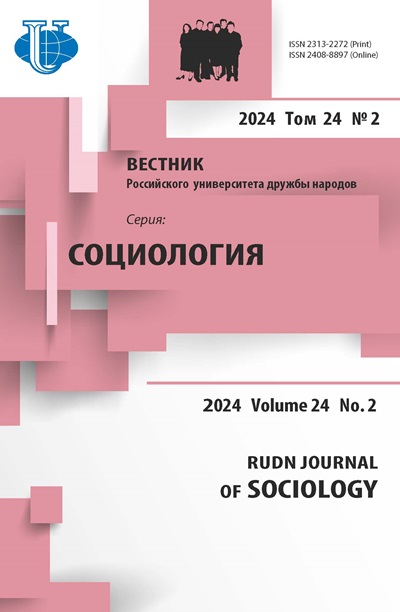Terrorism as a slap in the face of the civilized world
- Authors: Šubrt I1, Černý K1
-
Affiliations:
- Charles University in Prague
- Issue: Vol 16, No 1 (2016)
- Pages: 7-19
- Section: Theory, Methodology and History of Sociological Research
- URL: https://journals.rudn.ru/sociology/article/view/6522
Cite item
Full Text
Abstract
The article summarizes the key scientific approaches to the study of terror in the contemporary world focusing on the concepts of (de)modernization, (de)civilization, and the revival of religious movements with rational economic aims under the slogans of “just war” or “cosmic war” with the forces of evil. The author starts from Norbert Elias’ work on the civilization process and the formation of the modern state as a pacified society to underline that the problem of violence lies outside Elias’ scope, and demonstrate the existing approaches to supplementing his theory with (a) the definition of decivilization trends and the criteria for the identification of decivilization processes; (b) the description of the role and place of brutal violence in modern society; (c) a comprehensive but also heterogeneous picture of terrorism, especially suicide terrorism, i.e. its causes, manifestations and consequences. The author agrees with S.P. Huntington, that we live in a world with an increased risk of conflicts between civilizations and cultural strains rooting in the religious tradition (the re-politicization of religion and religious nationalism are considered attempts to fuse traditional religion with modern politics). Thus, the author concludes that the contemporary terrorism and especially its suicidal form is not only a specific form of (political) struggle, but also - metaphorically speaking - a “slap in the face” of the civilized Western world, an effort to challenge, shake and undermine the stability and the patterns of life in modern society. However, terrorism wants to influence not only the power system of society, but also the collective psyche of large groups and parts of the population to create a sort of theatre of horror with the rationally designed, staged and performed means of violence.
About the authors
I Šubrt
Charles University in Prague
Author for correspondence.
Email: jiri.subrt@ff.cuni.cz
Chair of Historical Sociology
K Černý
Charles University in Prague
Email: karlos.cernoch@post.cz
Chair of Historical Sociology
References
- Antonian J. Lichnost terrorista i voprosy borby s terrorizmom [The identity of terrorist, and the fight against terrorism] // Kudrjavtsev V.N. (ed.) Borba s terrorizmom. M.: Nauka, 2004.
- Bauman Z. Modernita a holocaust. Praha: Sociologické nakladatelství (SLON), 2010.
- Davie G. Europe: Exceptional Case. London: Orbis Books, 2002.
- Eisenstadt Sh. N. Multiple Modernities: der Streit um die Gegenwart. Berlin: Kulturverl, Kadmos, 2007.
- Eisenstadt Sh.N. The Great Revolutions and the Civilizations of Modernity. Leiden: Brill, 2006.
- Elias N. Über den Prozeß der Zivilisation: Soziogenetische und psychogenetische Untersuchungen. Bd. 1., II. Frankfurt am Main: Suhrkamp Verlag, 1976.
- Fletcher J. Violence and Civilization: An Introduction to the work of Norbert Elias. Malden: Polity Press, 1997.
- Horgan J. The Psychology of Terrorism. London-New York: Routledge, 2007.
- Huntington S.P. Střet civilizací. Praha: Rybka Publisher, 2001.
- Huntington S.P. The Clash of Civilizations? // Foreign Affairs. 1993. Vol. 72. No. 3.
- Juergensmeyer M. From Bhindranwale to Bin Laden: A search for understanding religious violence // Cady L.E., Sheldon S.W. (eds.) Religion and Conflict in Asia: Disrupting Violence. London: Routledge, Taylor and Francis Group, 2006.
- Juergensmeyer M. Global Rebellion: Religious Challenges to the Secular State, from Christian Militias to al. Qaeda. Berkeley: University of California Press, 2008.
- Juergensmeyer M. Terror in the Mind of God. The Global Rise of Religious Violence. Berkeley: University of California Press, 2000.
- Juergensmeyer M. The New Cold War? Religious Nationalism Confronts the Secular State. Berkeley: University of California Press, 1994.
- Kepel G. Boží pomsta. Křesťané, židé a muslimové znovu dobývají svět. Brno: Atlantis, 1996.
- Krueger A. What Makes a Terrorist. Princeton: Princeton University Press, 2007.
- Mann M. The Dark Side of Democracy: Explaining Ethnic Cleansing. Cambridge: Cambridge University Press, 2005.
- Mann M. The Sources of Social Power. Vol. 1-2. Cambridge: Cambridge University Press, 2006.
- Moghadam A. A Global Resurgence of Religion? Cambridge, Weatherhead Center for International Affairs - Harward University, 2003.
- Moore B. Social Origins of Dictatorship and Democracy: Lord and Peasant in the Making of the Modern World. London: Allen Lane, 1967.
- Pape R. Dying to Win. The Strategic Logic of Suicide Terrorism. New York: Random House, 2006.
- Pape R. The Strategic Logic of Suicide Terrorism // American Political Science Review. 2003. Vol. 97. No. 3.
- Pape R., Feldman J. Cutting the Fuse. The Explosion of Global Suicide Terrorism and How to Stop It. Chicago: The University of Chicago Press, 2010.
- Post J.M. Leaders and their Followers in a Dangerous World: The Psychology of Political Behavior. Ithaca: Cornell University Press, 2004.
- Skocpol T. States and Social Revolutions: A Comparative Analysis of France, Russia and China. Cambridge: Cambridge University Press, 1979.
- Střítecký V. Psychologie teroristického jednání // Souleimanov E. (ed.) Terorismus. Pokus o porozumění. Praha: Slon, 2010.
- Tilly C. Coercion, Capital and European States, AD 900-1990. Oxford: Blackwell, 1995.
- Treblin M.P. Terrorizm v 21 vieke [Terrorism in the XXIst century]. M.: Nauka, 2004.














